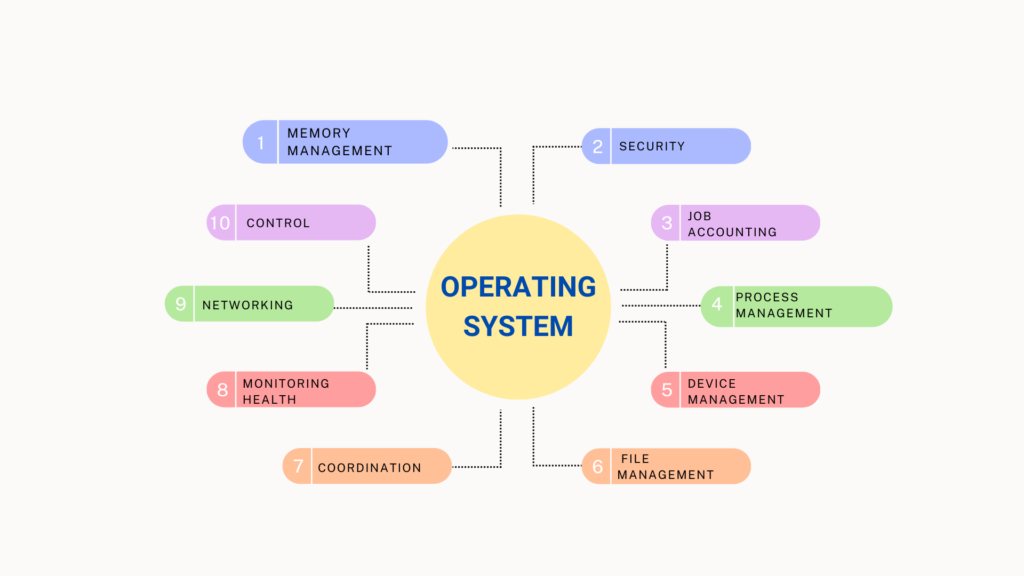what is an operating system? write the major functions of an operating system.
In the intricate world of computer systems, the operating system (OS) stands as the indispensable force that orchestrates hardware resources and delivers essential services to users and applications. Understanding the multifaceted functions of an operating system is paramount to navigating the digital realm effectively. Join us on a journey as we delve deep into the myriad roles played by an operating system and uncover the intricacies that make it the linchpin of modern computing. Resource Management: At the core of operating system functions lies resource management, a pivotal task that involves the efficient allocation and utilization of hardware resources. From the processing might of the CPU to the storage prowess of hard drives and the responsiveness of input/output devices, the OS ensures that every component works harmoniously to deliver optimal performance. Process Management: Operating systems are adept at managing processes, which are dynamic entities representing running instances of programs. Through sophisticated scheduling algorithms, the OS allocates CPU time, prioritizes processes, and coordinates their execution, thereby enabling smooth multitasking and resource sharing among applications. Memory Management: In the realm of memory management, operating systems employ ingenious strategies to maximize the utilization of available RAM. Techniques like virtual memory extend the system’s capabilities by intelligently swapping data between physical memory and storage devices, thereby enabling seamless operation even with memory-intensive applications. File System Management: The organization and manipulation of data reside within the domain of file system management. Operating systems provide a structured framework for storing, retrieving, and securing files on storage devices, ensuring data integrity, access control, and efficient data retrieval mechanisms. Device Management: From the humble keyboard to the sophisticated graphics card, operating systems oversee the management of input/output devices. By interfacing with device drivers, the OS facilitates seamless communication between software applications and hardware components, enabling users to interact with their systems effortlessly. User Interface: Operating systems offer a diverse array of user interfaces, ranging from intuitive graphical interfaces to command-line environments. These interfaces serve as the gateway for users to interact with applications, access system resources, and perform a myriad of tasks with ease and efficiency. Security Measures: In an era fraught with digital threats, operating systems play a pivotal role in fortifying system security. Through robust authentication mechanisms, access control protocols, encryption standards, and proactive threat detection measures, the OS safeguards sensitive data and system integrity against malicious actors. Error Handling and Troubleshooting: Operating systems are equipped with sophisticated error handling mechanisms that detect, log, and mitigate system errors and failures. By providing comprehensive error messages, diagnostic tools, and recovery options, the OS empowers users and administrators to troubleshoot issues effectively and minimize downtime. Networking Capabilities: In an interconnected world, operating systems facilitate seamless networking capabilities, enabling devices to communicate, share resources, and access remote services. From managing network configurations to supporting a plethora of communication protocols, the OS forms the backbone of modern networking infrastructures. System Services and Utilities: Operating systems are replete with a plethora of system services and utilities designed to streamline system management tasks. From software updates and system backups to performance monitoring tools and configuration utilities, the OS empowers users and administrators to optimize system performance, enhance reliability, and streamline maintenance workflows. Conclusion: In conclusion, the functions of an operating system form the bedrock of modern computing ecosystems, empowering users, applications, and devices to collaborate seamlessly and unleash their full potential. By unraveling the intricacies of resource management, process orchestration, memory optimization, and beyond, we gain a deeper appreciation for the indispensable role played by operating systems in shaping our digital experiences. As we navigate the dynamic landscape of technology, understanding and leveraging the diverse functions of operating systems becomes paramount. Whether you’re a seasoned IT professional, a curious enthusiast, or a business owner seeking to optimize digital workflows, the insights gleaned from exploring operating system functions pave the way for enhanced productivity, efficiency, and innovation in the digital age. Stay tuned to our blog for more in-depth explorations, practical tips, and insights into the ever-evolving world of operating systems and technology. jaisanacomputerservicesbtag.in
what is an operating system? write the major functions of an operating system. Read More »

